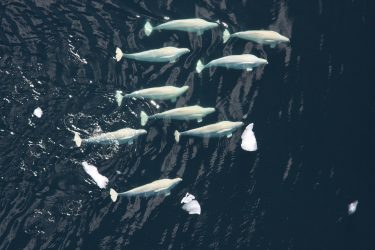
The reduction of Arctic sea ice has a clear impact on animals that rely on frozen surfaces for feeding, mating and migrating. But sea ice loss is changing Arctic habitat and affecting other species in more indirect ways, new research finds.
Beluga whales that spend summers feeding in the Arctic must dive deeper and longer to find food than in previous years, according to a new analysis led by University of Washington researchers. The study, published this month in the journal Diversity and Distributions, is one of the first to consider the indirect effects of sea ice loss on Arctic species that dwell near the ice but don’t necessarily depend on it for survival.
“I think this paper is novel in that we’re presenting some of the first indirect effects of sea ice loss for an Arctic whale species,” said lead author Donna Hauser, a postdoctoral researcher at the UW’s Polar Science Center and former doctoral student at the School of Aquatic and Fishery Sciences. “As changes in sea ice affect oceanographic properties, that could be affecting the distribution, abundance or species composition of prey for belugas.”
Read more at UW Today »
